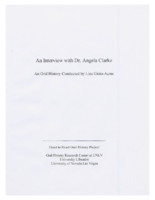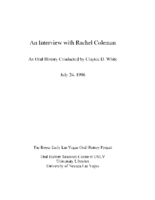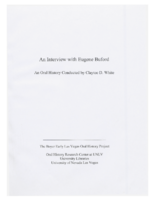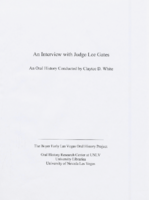Search the Special Collections and Archives Portal
Search Results
Junell Bowman oral history interview
Identifier
Abstract
Oral history interview with Junell Bowman conducted by Anna Huddleston on March 09, 2014 for the Boyer Early Las Vegas Oral History Project. Bowman begins by describing her early history as a singer in California, performing on the radio, different orchestras, and nightclubs before marrying her husband and moving to Las Vegas, Nevada in 1958. Bowman discusses becoming a sketch artist after managing an unsuccessful business, doing portraits and caricatures of people in the casinos, at conventions, and on the Las Vegas Strip. She talks about the celebrities and entertainers she met and did caricatures for while working at casinos like the Stardust and Riviera, and the amount of work that went into being a professional sketch artist.
Archival Collection
Eldon E. Gearing oral history interview
Identifier
Abstract
Oral history interview with Eldon E. Gearing conducted by Claytee D. White on February 07, 2013 for the Boyer Early Las Vegas Oral History Project. Gearing begins by describing how he developed his skills as a sheet metal worker through apprenticeships and his time in the United States Navy during World War II as an aviation metalsmith. Gearing discusses his air conditioning business and the contracting work he did for homes and casinos in Las Vegas, Nevada during the late 1950s and 1960s, including at Caesars Palace and the Tropicana. Other topics of discussion include rising drug use in the United States, his political opinions on issues such as welfare and government restrictions, and the future of Las Vegas.
Archival Collection
Leroy Payne oral history interview
Identifier
Abstract
Oral history interview with Leroy Payne conducted by Claytee D. White on January 29, 2013 for the Boyer Early Las Vegas Oral History Project. In this interview, Payne discusses working for Lockheed Overseas Corporation during World War II and his construction career in Las Vegas, Nevada. Payne describes traveling around England while employed by Lockheed Corporation and performing procurement duties for United States military bases. He also describes meeting and marrying his wife in Belfast, Ireland in 1943. Payne concludes by discussing their move to Las Vegas during the 1960s and his work in housing development constructing different neighborhoods and communities.
Archival Collection
Everlena Brown oral history interview
Identifier
Abstract
Oral history interview with Everlena Brown conducted by Claytee D. White on June 15, 2016 for the African Americans in Las Vegas: a Collaborative Oral History Project. In this interview, Brown discusses her upbringing in Moro, Arkansas and moving to Little Rock, Arkansas. She talks about the Little Rock Nine students and her experience attending a segregated school for African Americans. Brown recalls attending Clark County Community College (now College of Southern Nevada) and the University of Nevada, Las Vegas (UNLV), becoming a nurse, and the process of applying for nursing positions. Later, Brown discusses living in the Westside, entertainment on Jackson Street, and participating in church activities. Lastly, Brown describes changes in the Westside.
Archival Collection

Transcript of interview with Dr. Angela Clarke by Lisa Gioia-Acres, October 3, 2008
Date
Archival Collection
Description
Interview with Dr. Angela Clarke conducted by Lisa Gioia-Acres on October 3, 2008. A native of Baltimore, Maryland, Clarke spent a great deal of time reading medical texts and started working at Social Security by the age of fourteen. Following high school, she joined the women's Air Force and attended Morgan State College on the GI Bill. Clarke recalls instances of racism and the efforts she personally made to mitigate or change circumstances for blacks. Among her many awards, she was given a plaque for integrating Air Force swimming pools. Later accepted at University of Maryland, her first year's tuition was paid by the Jessie Smith Noyes Foundation. Clarke lived and practiced medicine in Beverly Hills until 1976, when a friend suggested that she was needed in Las Vegas as a board-certified family practitioner.
Text

Transcript of interview with Rachel Coleman by Claytee D. White, July 24, 1996
Date
Archival Collection
Description
Interview with Rachel Coleman conducted by Claytee D. White on July 24, 1996. Born in Fayette, Mississippi, Coleman moved to Las Vegas in the 1950s and began washing dishes at the Tropicana. In 1969, having worked for a number of hotels, she was promoted to executive housekeeper at The Hacienda. She ran for president of the Culinary Workers Union Local 226 in 1987. Coleman recalls Las Vegas race and labor relations through the decades.
Text

Transcript of interview with Eugene Buford by Claytee D. White, September 12, 2006
Date
Archival Collection
Description
Interview with Eugene Buford conducted by Claytee D. White on September 12, 2006. Buford came to Las Vegas as a child from Birmingham, Alabama. He held a variety of jobs, including washing dishes at the Last Frontier and delivering ice to casinos like the Flamingo and the Stardust, and ultimately retired after thirty-six years with the Post Office. Buford's great grandmother, Mary Nettles, was instrumental in the formation and growth of the NAACP chapter in Las Vegas, and he recalls meetings in her house and his own role as president of the Junior League NAACP. Buford shares memories of historical locations and events such as Helldorado, Block 16, and Carver Park, and several important figures in Las Vegas history, including James B. McMillan, Charles West, Jimmy Gay, Benny Binion, and the mafia.
Text

Transcript of interview with Judge Lee Gates by Claytee D. White, December 5, 1996
Date
Archival Collection
Description
Interview with Judge Lee Gates conducted by Claytee D. White on December 5, 1996. Born in Louisiana, Gates moved to Las Vegas around 1960. Following high school, he attended UNLV, where he was a member of the Black Student Association and studied under professor Roosevelt Fitzgerald, who raised his awareness of black history. Gates participated in the civil rights movement and worked as a lawyer before becoming a judge. He discusses Jackson Street, Dr. Charles West, attorney Charles Kellar, and his own involvement with Ruby Duncan's group.
Text

Transcript of interview with Rev. Marion D. Bennett, Sr. by Claytee D. White, January 12, 2004
Date
Archival Collection
Description
Interview with Rev. Marion D. Bennett, Sr. conducted by Claytee D. White on January 12, 2004. Bennett grew up in Greenville, South Carolina and graduated from Morris Brown College before earning his Master of Divinity from the Interdenominational Theological Center in Atlanta. He moved to Las Vegas in 1960 to pastor Zion United Methodist Church, ultimately growing his congregation to over six hundred members. Bennett speaks candidly about the racial tension that the Las Vegas community endured during integration and his fight to establish the Equal Rights Commission in Nevada. In 1973, he ran for the Nevada State Assembly and served for ten years, focusing on quality education and employment along with healthcare and equal rights.
Text
Transcript of bus tour of "Jewish Las Vegas" by Temple Beth Sholom, May 17, 2015
Date
Archival Collection
Description
Temple Beth Sholom organized and led a bus tour of parts of Las Vegas that are significant in local Jewish history. Stops on the tour included Woodlawn Cemetery and the former Temple Beth Sholom campus on Oakey Boulevard. Narrator Arlene Blut gives the overview of the Jewish community, and Rabbi Felipe Goodman talks to tour participants at the cemetery. Former Las Vegas mayor Oscar Goodman speaks at the old synagogue along with Josh Abbey, whose mother created the stained glass windows at the temple.
Text
